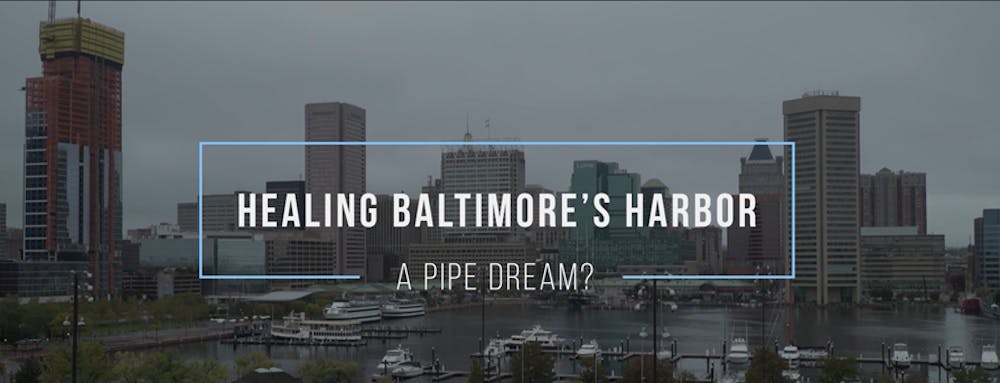From: Silver Screen
Student filmmakers’ environmental documentary shown at film festival

"Healing Baltimore's Harbor: A Pipe Dream?" was created by AU students and aired on Maryland Public Television.
On March 27, “Healing Baltimore's Harbor: A Pipe Dream?” was shown in the Doyle Forman Theater, bringing students and Washington, D.C. locals to hear more about Baltimore’s unsafe harbor. Students in Professor Mike English’s “Environmental Filmmaking for Public Television” class created the documentary examining Baltimore’s aged and crumbling sewage and stormwater infrastructure that continues to pollute the city’s harbor. Previously screened at the DC Environmental Film Festival, the short documentary has made its way into the conversations of DMV area environmental circles.
Beginning with overlaid audio announcements from Baltimore radio station WYPR, the documentary includes a combination of historical contexts to the harbor’s past as well as current interviews with those trying to clean up the mess.
Among these interviews include John Kellett, founder of Clearwater Mills LLC., Alice Volpitta and Barbara Johnson, water quality scientists at Blue Water Baltimore, Tim Wheeler, the Associate Editor & Senior Writer at Bay Journal and many other experts on the Baltimore Harbor.
According to the film’s website, “Every year, millions of gallons of sewage seep into Baltimore’s Inner Harbor. Coupled with tons of trash and surmounting stormwater runoff, this dangerous pollution is a threat to anyone who comes in contact with the water.”
Conceived, written, produced, shot, directed and edited by AU students, the film will air during Maryland Public Television’s Chesapeake Bay Week which runs from April 22-28. MPT will broadcast the short on April 24, 2018 at 7:30 p.m., and again on Saturday April 28 at 7 p.m.
Following the screening, professor Chris Palmer led a panel discussion with the students involved in the production. The filmmakers were Crystal Berg, Rebecca Castaneda, Danielle Criss, Sirjaut Kaur Dhariwal, Keeli Howard, Mike Kuba, Madison Long, Carlos Macher, Charles Mullen, Nawfel Raghay, Alec Smyth, Dee Starnes and Jean Vozella.
Producers Berg and Dhariwal led the team during the production under the supervision of professor and executive producer Mike English. English said the film had its initial premier in February 2018.
“We got emails from people that it resonated with, especially the residents of Baltimore that are paying exorbitant amounts in water bills to clean up the harbor,” English said. “The film started with exploring Blue Water’s mission of cleaning up the harbor to make it fishable and swimmable by 2020. But these very persistent students found a better angle which was the sewer leaks.”
“On a budget of -- drumroll please -- zero dollars, we did everything. Madison our graphics person that graduated this summer handled everything. We lucked out because we all brought something to the table and we all worked together so well,” said Dhariwal.
An audience member inquiring about Baltimore’s governmental response to the harbor’s pollution was met with an answer from segment producer, Raghay. “The city is working hard on fixing those problems but it’s a very long road. There are so many things that have to be accomplished from the city perspective as well as all of us that live in a big and old city but we just have to be aware,” he said.
Derry Allen, a retired program analyst at the Environmental Protection Agency, asked the filmmakers, “One of the important audiences for this film is obviously people from Baltimore and I’m curious what you can say about the level of understanding of the people in Baltimore on this issue?” Allen specifically inquired about how Baltimore residents feel about the increase in costs of water bills and other services associated with the inner harbor.
“I think the residents of Baltimore are outraged at the cost,” replied English. “In fact, I know they are because I live near there so I’ve seen them. They are outraged, unfortunately they are going to have to pay the price of the city’s negligence.”
Emphasizing that city officials did not do what they were “supposed to do to maintain the system,” English said the Federal Consent Agreement is forcing Baltimore citizens to pay the increasing water bills.
“As far as how aware [Baltimore citizens] are, we definitely got some responses,” Berg added. “They call it the ‘hell broth’ and I think the solutions were just as important as showing the problem in this case since they know it’s polluted but they wanted to know what can be done about it.”
Audience members commented on the production of the film as well as the editing of it. One viewer tells the filmmakers that “I thought the introduction was superb, it jumped right into the subject manner and I don’t recall it being so well done and concisely as that for other classes.”
While some of the the students expressed a desire to continue in the realm of environmental filmmaking, others said while the passion for environmental issues is close to their heart they would like to further their careers in other fields. Among some of these fields include arts and entertainment, communication science, and other forms of documentary work.
Finally, Palmer asked the filmmakers to share their biggest takeaways from the project. Macher, segment producer, said, “Be fully committed to it and give what you love best to the team.”
Echoing off that, coordinating producer Smyth added, “It’s not really a class, it’s a project. You don’t have lessons, you’ve got planned meetings. To be productive and be a team member, it’s not a traditional way of learning.”




